During Sultan Husain Shah’s reign, Mir Ali Haft Qalam came to Kashmir from Iran. He was a noted calligrapher. Bestowed with the title of Haft Qalam, Mulla Bakir Kashmiri was another famous court calligrapher of emperor Shah Jahan. Numerous Kashmiri calligraphers carried the legacy of calligraphy and passed it on to generations. Sobia Mushtaq is one such passionate lover of calligraphy.
Musheera Ashraf, TwoCircles.net
Kashmir, which is often referred to as the land of Sufi saints, has always been famous for its rich culture and heritage. The values brought in by the scholars and saints hold great importance in the lives of the Kashmiri people. According to the Archeological Survey of India, one such art method i.e. calligraphy was introduced to Kashmir by the scholar saint Sharaf-ud-Din Bulbul in the fourteenth century A.D.
Despite the ongoing conflict and its severe impact on the mental health of the people, Kashmiri people continue to flourish with their centuries-old craft.
“The roots of Arabic calligraphy are strongly embedded in Kashmir. They connect us to our spiritual being,” says Sobia Mushtaq, a 23-year-old young calligrapher from the Bandipora district of North Kashmir. “Arabic Calligraphy is a way of connecting to God,” she adds.
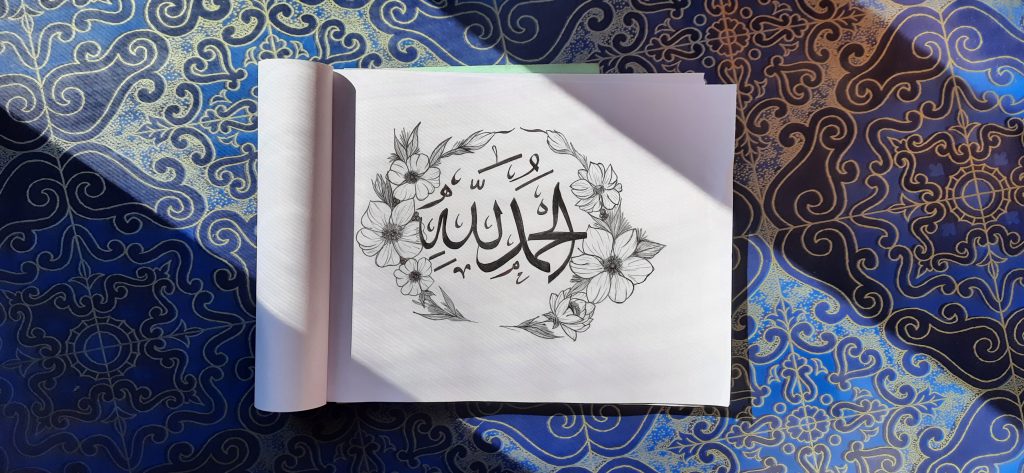
Sobia started doing calligraphy when she was in 7th standard but had to leave it as studies took most of her time. Sobia says she was always passionate about the art of calligraphy. She completed her post-graduation in English last year and is currently preparing for competitive exams. After completing her PG, she decided to take up the art and started posting her calligraphy works on social media.
Soon people began to like her calligraphy and she started getting orders. She happily says, “People like my work and my family has always encouraged me to carry on with this artwork”. Whatever little money Sobia makes from her work, she buys pens, paint, ink and papers.
“Sobia has a thirst to learn everything about calligraphy. We are proud of her work,” says her sister. “She is passionate about her work. That is what brings sharpness in her writing,” her sister adds.
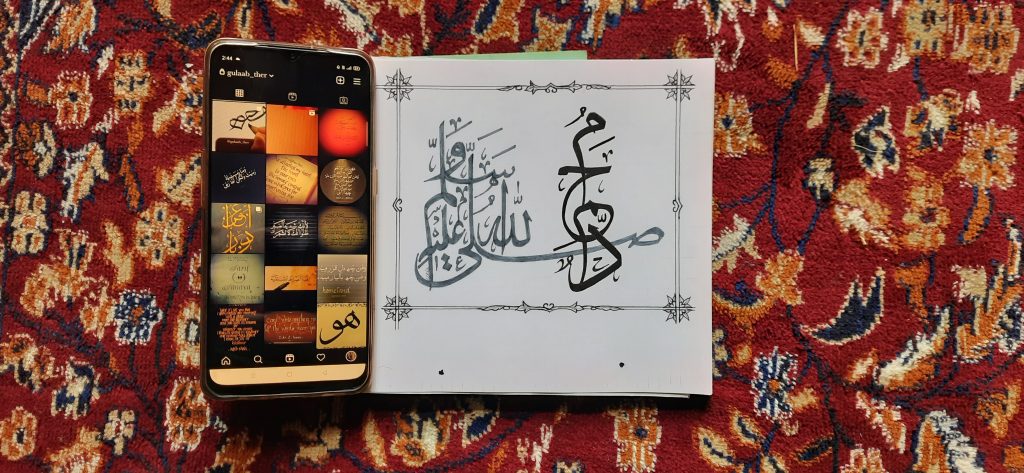 Sobia mainly does Arabic calligraphy. She used to make sketches but calligraphy is her main passion.
Sobia mainly does Arabic calligraphy. She used to make sketches but calligraphy is her main passion.
“Calligraphy enriches faith, connects me to the Quran. It helps me to strengthen my faith and draws me closer to Allah,” she says.
Sobia does name calligraphy, she likes to do calligraphy of resistance poetry, but her passion is in Arabic calligraphy.
With the emergence of technology, every design is a click away but, “what makes one a good calligrapher is practice and willpower.” Sobia opines, “The calligraphed artwork has its charm.” For Sobia, the smell of ink brings the hidden essence to the art.
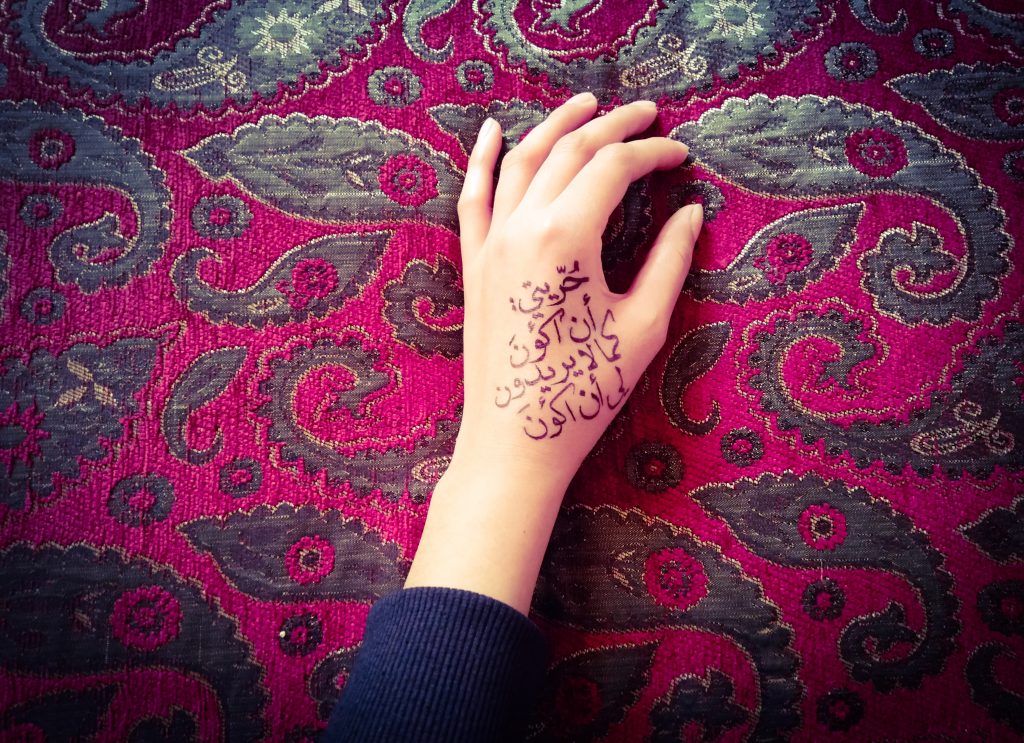
Sobia, being a self-taught calligrapher says that she learns by practice and by seeing videos online but she is against plagiarism of artwork. “One should come up with something new. I have imitated and used the traditional techniques to convert them into modern calligraphy,” she said.
In one of the statements issued by the Archeological Survey of India, during Sultan Husain Shah’s reign, Mir Ali Haft Qalam came to Kashmir from Iran. He was a noted calligrapher. Bestowed with the title of Haft Qalam, Mulla Bakir Kashmiri was another famous court calligrapher of emperor Shah Jahan. Numerous Kashmiri calligraphers carried the legacy of calligraphy and passed it on to generations.
Arabic script and Kashmiri script are similar. “I write Arabic and with a slight change I write Kashmiri,” Sobia says while sharing her aspiration to do wall calligraphy in future. She wants to do calligraphy on the walls, tombs and shrines in Kashmir.
For Sobia, Arabic calligraphy is the best example of learning by doing.
Among many cultural artefacts that Mughal’s introduced in Kashmir, calligraphy is one of them. “These things are a part of our culture. Calligraphy is flourishing now and the young generation is inclined towards this art,” says Sobia.
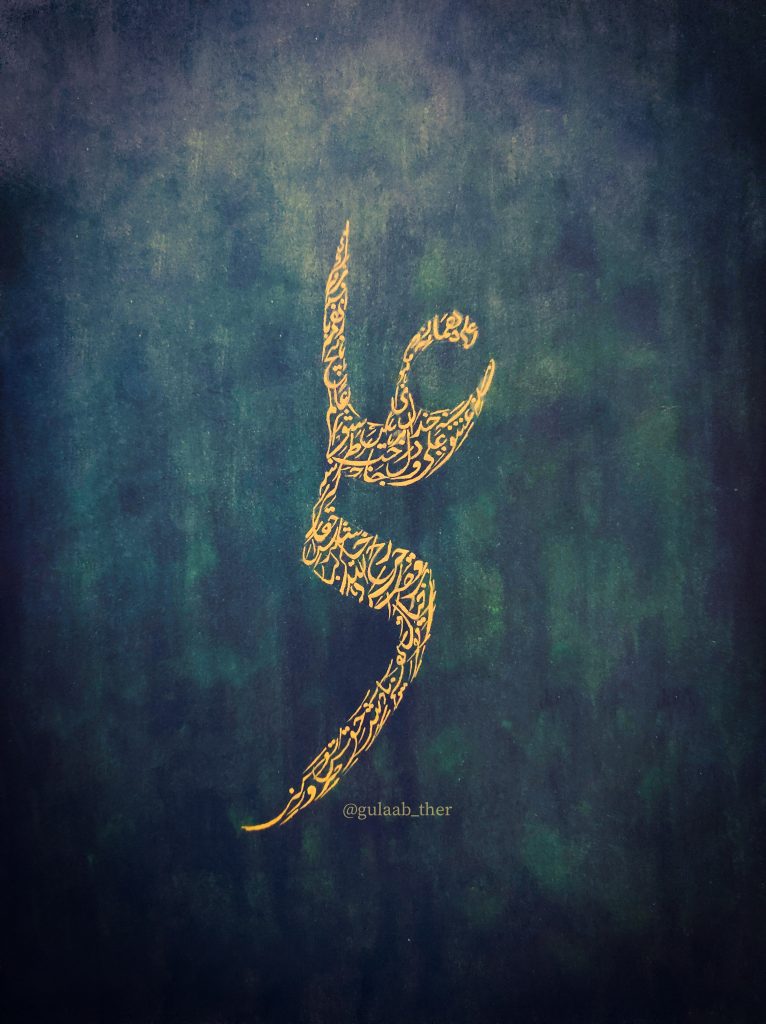
The famous Spanish painter Pablo Picasso once said, “If I had known there was such a thing as Islamic Calligraphy, I would never have started to paint. I have strived to reach the highest levels of artistic mastery, but I found that Islamic Calligraphy was there ages before I was.”
Sobia says she does dual calligraphy combining modern backgrounds with Islamic calligraphy.
Frequent internet shutdowns in Kashmir have impacted every aspect of Kashmiri people’s lives.
“Under lockdown, we were not able to get our material and we were not able to deliver orders on the proper time, ran from ink and other items,” Sobia says.
Talking about the other side of the internet shutdowns, Sobia says that it helped her to focus more on her work. “This seclusion, without the internet, helped me to devote myself to this art,” she says.
Sobia wants the younger generation of Kashmiris to learn this art. “It tells us about our faith. Whenever I write down any verse, I search for the meaning and try to understand it before writing. This is how it enhances my faith,” she says.
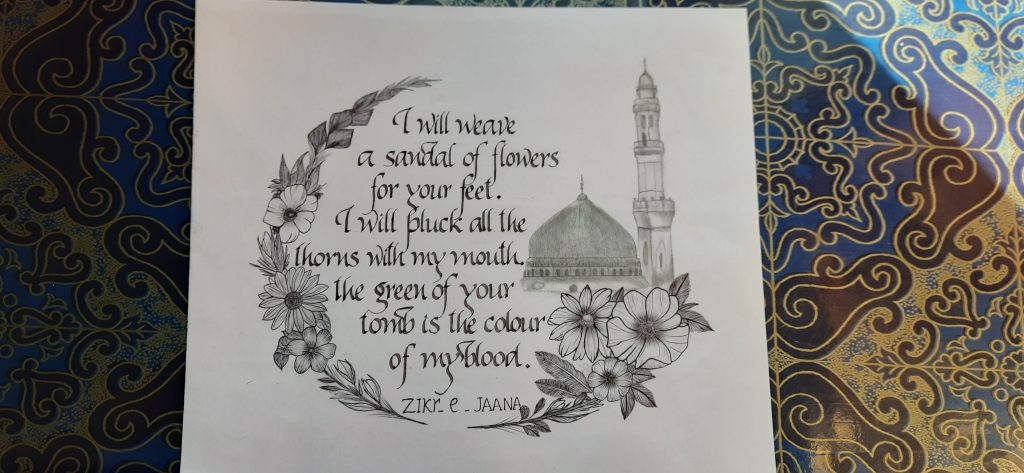 The pens like kamish, bamboo, celi, java handam are expensive and none of them are available in her district. She usually orders her pens from a store in Srinagar, the summer capital of Kashmir. Elkhatt Store in Srinagar is the store that provides pens and ink for calligrapher lovers. Sobia proudly says that she started with a set of Rupees 200 basic pens and she still uses them.
The pens like kamish, bamboo, celi, java handam are expensive and none of them are available in her district. She usually orders her pens from a store in Srinagar, the summer capital of Kashmir. Elkhatt Store in Srinagar is the store that provides pens and ink for calligrapher lovers. Sobia proudly says that she started with a set of Rupees 200 basic pens and she still uses them.
“Tools don’t make an artist but the artist makes the tools,” Sobia says. Sobia lives in Bandipora and she hardly gets the paper there. Either she orders online or goes to Srinagar to get her calligraphy equipment.
“If one has the will they can do good calligraphy with the basic available resources. When people DM me asking about my art and the technique used, I happily share with them,” she says.
“The artists don’t reveal their secrets, but I think they should reveal the secrets so that this art could flourish and more people may come forward. If they share their art and secrets their art will propagate otherwise that will be confined to themselves. All it takes the practice and technique to handle the brush and tools,” she adds.
Sobia wants to open a calligraphy store one day. “It is important to get orders. This enhances confidence and also helps to get resources,” she says.


